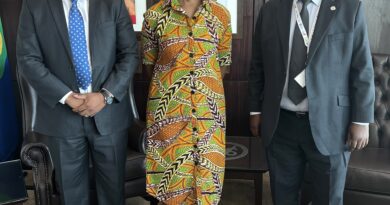IMF Concludes Key Reviews with Kenya, Approves $606 Million Disbursement to Bolster Economic Stability
The International Monetary Fund (IMF) Executive Board has successfully completed its seventh and eighth reviews under Kenya’s Extended Fund Facility (EFF) and Extended Credit Facility (ECF) arrangements, alongside a review under the Resilience and Sustainability Facility (RSF) arrangement.
This move enables a substantial disbursement of approximately $606 million, aimed at fortifying Kenya’s fiscal and external resilience amid a challenging economic landscape.
This funding injection, combining $485.8 million under the EFF/ECF arrangements and $120.3 million under the RSF, underscores the IMF’s support for Kenya’s efforts to rebuild fiscal and foreign exchange reserves, strengthen governance, and counteract climate shocks.
The IMF’s action also follows significant strides in stabilizing the Kenyan shilling and shoring up international reserves after the country’s recent resolution of its external financing challenges.
IMF First Deputy Managing Director and Acting Chair, Gita Gopinath, acknowledged Kenya’s economic resilience, pointing to stronger-than-expected foreign exchange reserves and stabilizing inflation. However, she highlighted a difficult path ahead for Kenya’s fiscal strategy.
The country must ramp up domestic revenues to meet debt obligations while safeguarding spending in critical sectors. The revenue shortfall in the fiscal year 2023/24, compounded by the public withdrawal of the 2024 Finance Bill, presents ongoing challenges.
“A credible fiscal consolidation strategy is essential,” Ms. Gopinath emphasized, “not only for debt reduction but also to ensure effective use of public resources. This will require strengthening Kenya’s tax regime and reinforcing transparency in public finances to sustain political and social support for these reforms.”
The EFF/ECF and RSF programs are designed to stabilize Kenya’s macroeconomic environment, reduce debt vulnerabilities, and mitigate climate risks. With a financial commitment of $3.61 billion under the EFF/ECF and $541.3 million under the RSF, the IMF aims to aid Kenya in safeguarding resources for social priorities, boosting economic resilience, and achieving sustainable growth.
Ms. Gopinath also underscored the need for Kenya to adapt to economic risks through agile policymaking, especially in areas such as public debt and governance reforms. She noted that recent policy changes, like the Central Bank of Kenya’s focus on exchange rate flexibility, are crucial to safeguarding the economy against external shocks.
Despite current challenges, Kenya’s economic indicators show promise. Real GDP growth is projected to stabilize around 5% over the next two years, while inflation is expected to decline. Nonetheless, Kenya faces high public debt, and the IMF stresses the importance of bolstering tax revenues and implementing structural reforms to strengthen its financial foundation and mitigate external vulnerabilities.
The IMF concluded by reiterating its commitment to supporting Kenya’s economic reforms and climate adaptation initiatives, emphasizing the role of good governance and accountability in building investor confidence and enhancing public trust.



